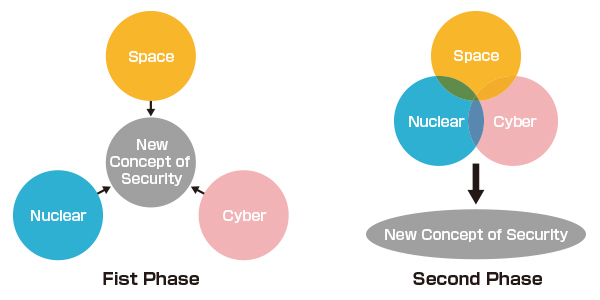The MOFA Project:
"The Diversification of Risk in International Society and New Dimensions of Security/Foreign Policy"
There is currently a strong need to define the issue of security from a new dimension. This new approach takes into consideration the ways and means of "risk approach" as risks in international society have diversified in the 21st century. This project, therefore, plans to explore the fields of space, nuclear, and cyber security individually as well as their complex interaction, trying to propose comprehensive counter-measures as well as to build a cross-cutting network of experts to the further revitalization of such discussions.
First, the project will focus on the fields of "space" and "nuclear" security. These are pre-existing, yet new topics when security issues are considered. Space has continuously been regarded as an important part of security since the early Cold War era. It has not only been utilized for security purposes, but also a subject of security. Nevertheless, during the Cold War, the United States and the Soviet Union were front liners of space activities. Space policy was directly linked to deterrence strategy of the two superpowers, which allowed the attainment of a certain stability and common understanding. This balance collapsed with the end of the Cold War, while new and diverse actors have started up new space activities, prompting the necessity to rethink space security in a new dimension.
The nuclear issue shares a number of similarities with space. It was originally dealt in international politics as one of the core questions of arms control and disarmament. This trend has shifted to nuclear issues being dealt vis--vis proliferation matters and risk management. Military use and civil use of nuclear technologies has become ambiguous increasingly, and thus an urgent need has risen for an international network of comprehensive nuclear risk management that crosscuts military and civil use.
Third, we will focus on the issue of cyber security. This issue is an exceedingly new security task, the product of the fast-growing advancement in science and technology which cannot be dealt with solely in the traditional security framework. Rising and developing states are not the only actors here: we are experiencing a massive power transition from states to individuals. On the other hand, threats caused by cyber-attacks must be dealt with state-based prevention/defense strategies, which occasionally relies on multilateral cooperation among states as well. Although cyber security is a next-generation security issue, the ways and means to counter them are still very traditional, leaving us no choice to separate our policy from traditional security concepts. In other words, this issue can be categorized as being a conceptually new but also recurring foreign policy matter.
In this project, we will conduct research in all three issue fields respectively, as well as examine the correlation among them.

For example, space systems have long been utilized as means of arms control and inspection of nuclear tests. A simple nuclear explosion in outer space will produce fatal damage to mostly all of space systems on our terrestrial orbit. For a stable and sustainable use of the space system, stability in cyber space is necessary. Finding ways to tackle cyber-attacks against space systems and infrastructure on the ground has become a serious task in today's space security policy. The infamous cyber-attack on Iranian nuclear facilities using the Stuxnet virus became a wide concern not only among the cyber community, but also in the field of nuclear nonproliferation as well as bilateral/multilateral relations among concerned states. The three pillars for this study are indeed deeply interconnected, and require the conduct of a cross-cutting research, as prospected in this project.
Furthermore, the project intends to build a theoretical foundation to understand security issues in the 21st century based on the three case studies mentioned above. This will include, firstly, the examination of a new approach taking into consideration the issue of risk and safety. Secondly, there is an urgent need for the examination of the concept of deterrence. Although deterrence has long been understood in the framework of state-to-state politics, we are entering an era in which deterrence has become multilayered. Although the question is simply a matter of "'who' wants to deter 'whom' in 'what' form", the actors can range from state to individual, and the means to attain it have become more complicated. This project, organized by the Security Studies Unit of the Policy Alternatives Research Institute, will make the most of human resources of the University of Tokyo, its international network of inter-university relations, and individuals in order to propose a foundation for Japan's foreign policy in the 21st century.
Moreover, the project simultaneously aims at building an international network of professionals, especially a bridge towards the next generation of scholars and practitioners. In order to put our new thoughts and ideas into effect for the 21st century foreign policy, there is a strong necessity to share our thoughts with practitioners. Also in order to nourish the next generation of scholars and practitioners, training them directly would become necessary. Training workshops which invites these potential candidates that would shape security policies in the 21st century will be an important place to promote and discuss our on-going process and results of the project.
It is important that we influence our country's mid-term/long-term policy, and this would be one crucial way to do so. Many prestigious research projects have produced exciting results that may have changed our foreign policy dynamically in the past, but have not completely done so. This project will try to break through this hard task. Interaction among practitioners and scholars will presumably fill in the gap that exists between academia and bureaucracy, as well as senior and young practitioners and scholars. Foreign and security policies are a result of a group effort of both practitioners and scholars, young and senior. This project, together with the result of academic research, aims to embody this point as well.
